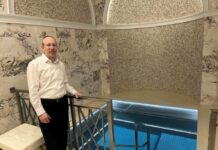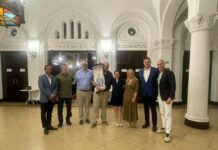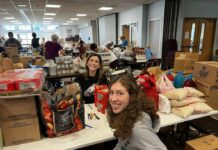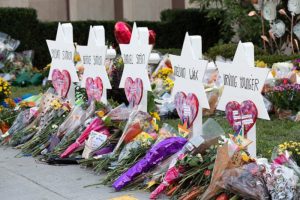 When a white supremacist shot and killed 11 people at the Tree of Life Synagogue in Pittsburgh on Oct. 27, 2018, it was “the deadliest attack on the Jewish community” in United States history, according to several media outlets.
When a white supremacist shot and killed 11 people at the Tree of Life Synagogue in Pittsburgh on Oct. 27, 2018, it was “the deadliest attack on the Jewish community” in United States history, according to several media outlets.
It also changed the consciousness of the nation’s Jewish community, Philadelphia rabbis say.
Before Pittsburgh, the synagogue was a place of comfort. Post-Pittsburgh, it’s still a house of worship and connection. But it’s also a place where anxiety and fear lurk in the background.
“It opened our eyes to the reality that antisemitism continues to exist and will continue to exist,” said Rabbi Abe Friedman of the Conservative Temple Beth Zion-Beth Israel in the city.
Friedman grew up in a Jewish U.S. with a hopeful story: Antisemitism died in World War II with the Nazis.
That doesn’t mean that the rabbi was ignorant of the long history of antisemitism. His elders even taught him that the attitudes were still very much present.
Specifically, Friedman often heard the story of Leo Frank, the Jewish businessman in early 20th-century Georgia who was hanged after being wrongfully convicted of killing a 13-year-old female employee. His tragic story helped spark the creation of the Anti-Defamation League, the Jewish nongovernmental organization known for tracking antisemitic incidents.
But for Friedman and other young Jews of the postwar era, the story was a warning from a distant time. It was something that still had to be prevented, but it was also something that used to happen.
“Even when we had security fears, like there’s a war in Israel, it was always tangential,” he said.
During that same period, Ken Jacobson, the deputy national director of the ADL and a 50-year employee, used to get a recurring question from fellow Jews.
“Why are you spending your time on antisemitism?” they would ask.
For decades, Jacobson gave the same answer.
“Things have gotten better, and we should be happy about that, but don’t get complacent,” he said.
“Then Pittsburgh happened,” he added.
According to the ADL, antisemitic incidents have surged in recent years, with 2019 setting a record of 2,107 in the U.S. The ADL began tracking incidents in 1979.
While those numbers are jarring, they are still just numbers. A shooting at a synagogue is different, Jacobson said.
“It’s a tremendously traumatic event,” he said. “It’s something that American Jews have really never experienced.”
Earlier this month, the Jewish Federations of North America announced a $54 million security initiative to help protect synagogues and other Jewish institutions. But local synagogues had already started looking after themselves.
Friedman’s BZBI went from using a security guard most of the time to using one anytime the building was open. The synagogue added a door with a locked barrier between its preschool/Hebrew school and the rest of the building.
At Congregation Beth Solomon, an Orthodox synagogue in Northeast Philadelphia, members must enter the building code before coming in. A security guard now mans the door outside Shabbat services. And Rabbi Solomon Isaacson encourages congregants to get licenses to carry guns.
“We have to be aware,” Isaacson said.
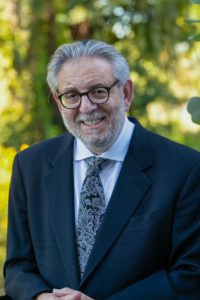
The morning after Pittsburgh, Rabbi Eliott Perlstein of Conservative temple Ohev Shalom of Bucks County called a meeting with synagogue leaders. They made what Perlstein described as a consensus decision.
“At every Shabbat service, there needed to be a security guard,” he said. “And at every day of Hebrew school, there needed to be a security guard.”
Then, they asked congregants to pay more in dues to share in the costs of keeping everyone safe. Ohev Shalom had never added a fee in the middle of a year before, Perlstein said. Yet no one objected.
“They knew we needed it. They knew the kids needed it,” Perlstein said. “That’s where the spiritual and the practical meet.”
According to Isaacson, in this new normal, his congregants walk around paying closer attention to the neighborhood than they did before. If they hear a noise outside the synagogue, they look out the windows.
“They are ready to call the police at a second’s notice,” he said. “And it was never like this before.”
But several other local rabbis said that, as the years continue to pass, the enhanced security, as well as the feeling of it, becomes more of a background feature.
The U.S. is still a welcoming place for Jews. Synagogues are still safe. Rabbis still tell their congregants not to be afraid.
But they do remind them to be aware.
“That’s the biggest change,” Friedman said. “‘Oh, it could happen here. It still probably won’t, but it could.’”
[email protected]; 215-832-0740



